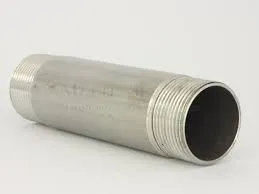-
Cangzhou Yulong Steel Co., Ltd.
-
Phone:
+86 13303177267 -
Email:
admin@ylsteelfittings.com
- English
- Arabic
- Italian
- Spanish
- Portuguese
- German
- kazakh
- Persian
- Greek
- French
- Russian
- Polish
- Thai
- Indonesian
- Vietnamese
- Zulu
- Korean
- Uzbek
- Hindi
- Serbian
- Malay
- Ukrainian
- Gujarati
- Haitian Creole
- hausa
- hawaiian
- Hebrew
- Miao
- Hungarian
- Icelandic
- igbo
- irish
- Japanese
- Javanese
- Kannada
- Khmer
- Rwandese
- Afrikaans
- Albanian
- Amharic
- Armenian
- Azerbaijani
- Basque
- Belarusian
- Bengali
- Bosnian
- Bulgarian
- Catalan
- Cebuano
- China
- China (Taiwan)
- Corsican
- Croatian
- Czech
- Danish
- Esperanto
- Estonian
- Finnish
- Frisian
- Galician
- Georgian
- Kurdish
- Kyrgyz
- Lao
- Latin
- Latvian
- Lithuanian
- Luxembourgish
- Macedonian
- Malgashi
- Malayalam
- Maltese
- Maori
- Marathi
- Mongolian
- Myanmar
- Nepali
- Norwegian
- Norwegian
- Occitan
- Pashto
- Dutch
- Punjabi
- Romanian
- Samoan
- Scottish Gaelic
- Sesotho
- Shona
- Sindhi
- Sinhala
- Slovak
- Slovenian
- Somali
- Sundanese
- Swahili
- Swedish
- Tagalog
- Tajik
- Tamil
- Tatar
- Telugu
- Turkish
- Turkmen
- Urdu
- Uighur
- Welsh
- Bantu
- Yiddish
- Yoruba

Nov . 06, 2024 14:51 Back to list
api5lx52 specification
Understanding API 5LX52 Specification A Comprehensive Overview
The API 5L specification is a critical standard developed by the American Petroleum Institute (API) that governs the manufacturing and testing of line pipe for the transportation of oil, gas, and other fluids. It serves as a crucial reference for various industries that require high-quality pipe materials to ensure the safe and efficient movement of fluids. API 5L Grade X52, a specific grade within this standard, exhibits a set of mechanical properties and chemical compositions that make it suitable for high-pressure applications.
Overview of API 5L Grade X52
API 5L Grade X52 is designed for use in pipelines that transport natural gas, crude oil, and water in the oil and gas industry. The X in X52 signifies the minimum yield strength of steel pipes; in this instance, X52 indicates a minimum yield strength of 52,000 psi (pounds per square inch). This high yield strength enables the use of thinner wall pipes, resulting in weight savings and more efficient installations.
Chemical Composition
The chemical composition of API 5L X52 steel plays a significant role in its properties. The standard specifies a maximum composition of carbon, manganese, phosphorus, sulfur, and other elements to enhance the performance and durability of the pipe. For example, the carbon content is restricted to a maximum of 0.26% to prevent brittleness, while manganese is usually kept between 1.2% and 1.6% to improve ductility. Adhering to these specifications ensures that the pipe can withstand the harsh conditions it may encounter during its service life.
Mechanical Properties
api5lx52 specification

The mechanical properties of API 5L Grade X52 are particularly notable. Besides its yield strength, the specification also sets requirements for tensile strength, elongation, and impact resistance. For instance, the minimum tensile strength must be at least 70,000 psi, and elongation must be a minimum of 21% in 8 inches, indicating that the material can stretch significantly before failure. Furthermore, impact tests at low temperatures ensure that the pipe can maintain its integrity in colder climates, making it suitable for a wide range of environmental conditions.
Manufacturing Process
The production of API 5L X52 pipe involves several steps, including the transformation of raw steel into finished products using methods such as hot rolling or seamless manufacturing. Quality control during these processes is paramount to ensure that the pipes meet the stringent requirements outlined in the API standard. Testing methods, including non-destructive testing (NDT) and hydrostatic testing, are routinely employed to verify the integrity and performance of the pipes.
Applications and Industry Importance
API 5L Grade X52 pipes are widely utilized in the construction of pipelines across many sectors. Its robustness and reliability make it integral to the oil and gas industry where high-pressure and high-temperature conditions are the norm. The ability to withstand harsh environments while maintaining a safe and efficient flow of resources is essential for operational sustainability.
Conclusion
In summary, API 5L Grade X52 plays a vital role in modern pipeline systems, providing the strength and durability required for effective fluid transportation. Understanding its specifications, including chemical composition and mechanical properties, is essential for engineers and industry professionals tasked with designing and maintaining pipelines. By adhering to API standards, the industry can ensure operational safety and efficiency, ultimately benefitting the global energy supply chain.
Latest news
-
ANSI 150P SS304 SO FLANGE
NewsFeb.14,2025
-
ASTM A333GR6 STEEL PIPE
NewsJan.20,2025
-
ANSI B16.5 WELDING NECK FLANGE
NewsJan.15,2026
-
ANSI B16.5 SLIP-ON FLANGE
NewsApr.19,2024
-
SABS 1123 FLANGE
NewsJan.15,2025
-
DIN86044 PLATE FLANGE
NewsApr.19,2024
-
DIN2527 BLIND FLANGE
NewsApr.12,2024
-
JIS B2311 Butt-Welding Fittings LR/SR 45°/90° /180°Seamless/Weld
NewsApr.23,2024











